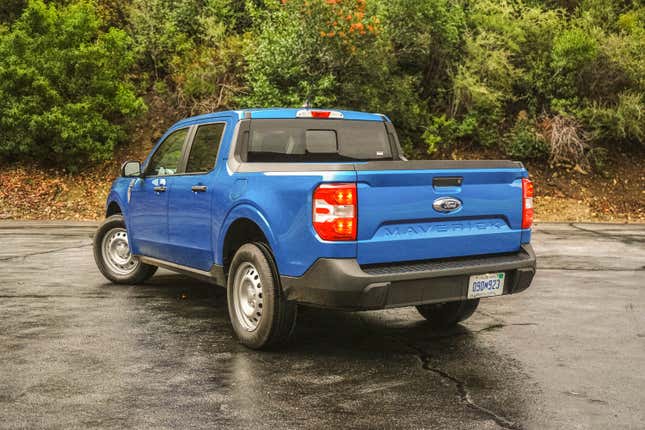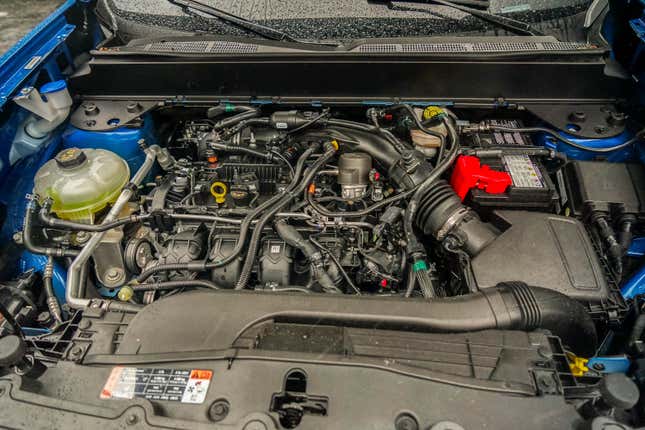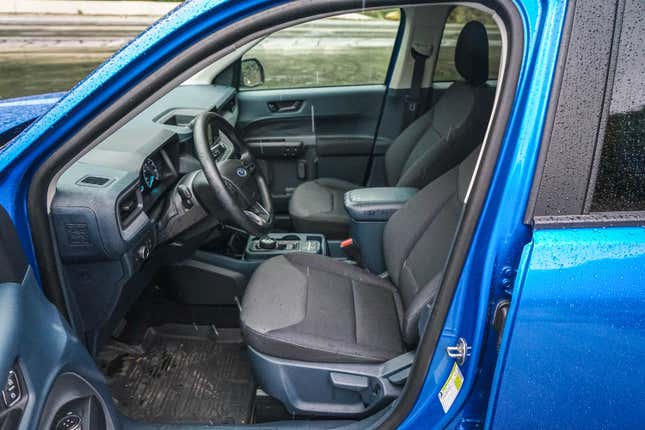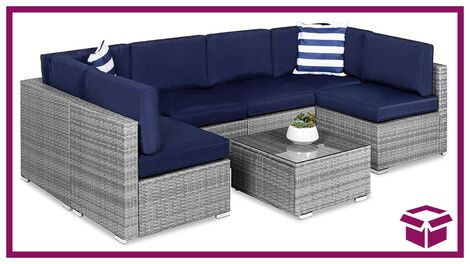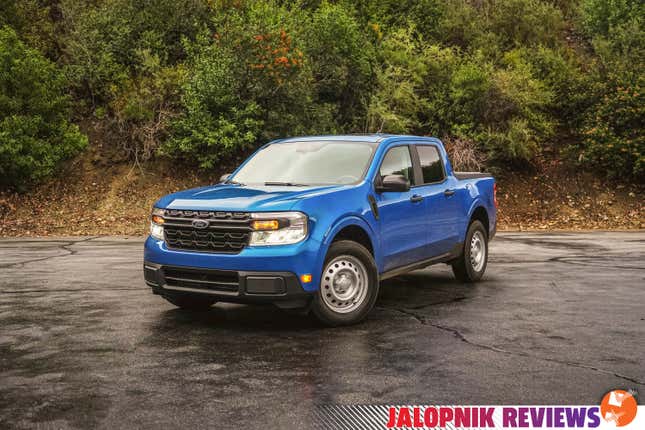
Life is full of conflicts. I love cars and motorcycles, but I also care about the environment. I live in a house and have a lot of projects, so I find having a pickup truck around to be pretty useful, but owning a full-size truck seemed wasteful. That’s what makes the economical, practical Ford Maverick so great. It almost seems tailor-made for people like me.
The Maverick is tiny by truck standards, but it’s big enough to do the vast majority of tasks I’d need a truck for, like hauling motorcycle parts or going to the local Home Depot. Plus, it’s small enough to drive and park easily in a city like Los Angeles.
Full Disclosure: Ford wanted me to drive a base model Maverick so badly that one appeared at my house for a week with a full tank of gas. This is pretty standard procedure for review vehicles in the automotive industry and I did, in fact, have to return the lil dude at the end of my review period.
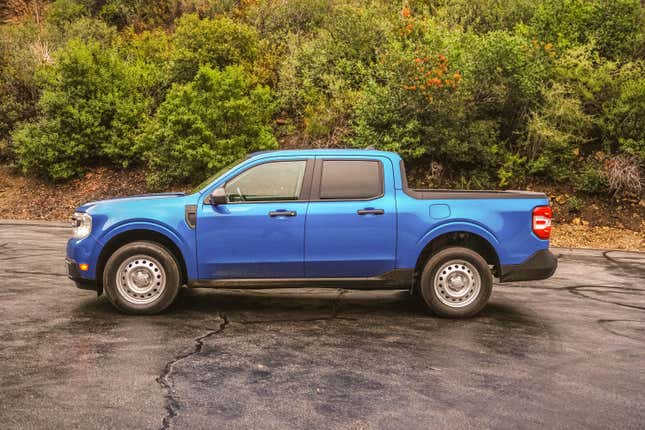
Truly, the base Maverick is the star of the lineup. It comes equipped with a 2.5-liter hybrid drivetrain that offers up 162 hp and 155 lb-ft of torque. Those figures aren’t going to blow anyone’s doors off, but EPA fuel economy ratings of 40 mpg city, 33 mpg highway and 37 mpg combined makes it a compelling option. The other available engine is a 2.0-liter EcoBoost turbo four-cylinder which makes a more robust 250 hp and 277 lb-ft at the expense of more noise and considerably worse mileage (23 mpg city, 30 mpg highway and 25 mpg combined). Sadly, if you want all-wheel drive, the turbo-four is your only option.
The hybrid drivetrain is paired with a continuously variable transmission, which makes it not so great for towing (2,000 pounds max). The EcoBoost motor comes with a conventional eight-speed automatic and is available with a towing package that doubles the capacity to 4,000 pounds. Payload capacity is 1,500 pounds for both versions, which is good, but if towing is a real priority, you’re likely better off buying a bigger truck.
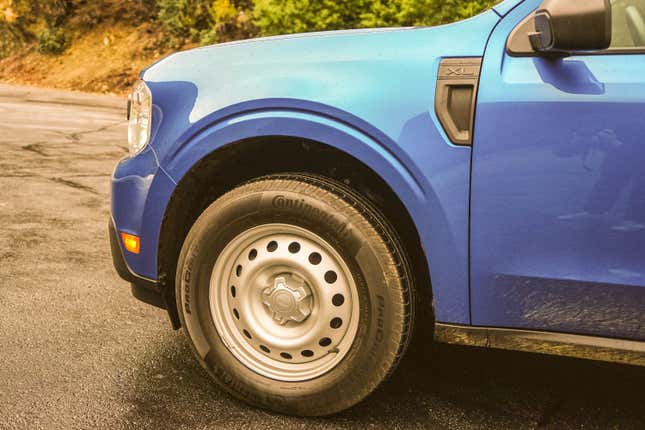
My test vehicle is a bottom-of-the-line XL mode, equipped with the 2.0-liter turbo motor and a couple of basic options like a sunroof, a sliding rear window, a tow hitch and a spray-in bedliner. Other than that, this li’l guy is basic. When was the last time you had to start a brand new car with a traditional key?
The power from my 2.0-liter example is fine, though the way it’s delivered is a little jerky and peaky. The engine sounds like a bowling alley full of angry bees, and that noise is projected directly into the cabin, thanks to the lack of sound deadening.
The Maverick drives a lot more like a car than a truck, which makes sense. It uses a unibody design with a light payload capacity which means the ride quality, even when unladen, is pretty good. It’s not plush, per se, but the Maverick is certainly good enough to drive all day without feeling like your spine is going to jettison through the top of your skull. The Maverick’s handling is also relatively car-like, with light steering and predictable handling characteristics.
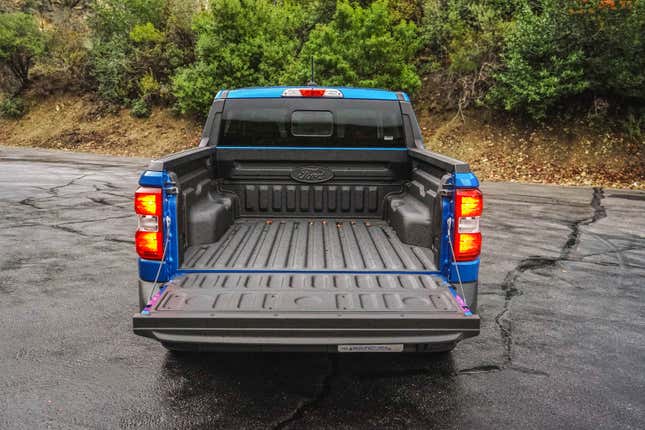
As far as doing “truck stuff,” the Maverick is totally up to most tasks. My wife and I can fill the back with soil for her garden and we appreciate the relatively low load height. Packing the back near-to-bursting with cardboard, yard debris and other crud for a run to the local dump is successful, too, and the guy at the pay station thinks the Maverick is cool. One annoying thing about this experience, though, is that due to the Maverick’s short bed, I have to load stuff with the tailgate down and strap it in. That’s fine most of the time, but this means the backup camera is useless because it’s mounted near the latch on the tailgate. I’d rather see this camera housed down by the license plate, but that’s a small criticism.
With its starting price of $23,690 including $1,495 for destination, the Maverick is a cheap truck, and it feels like it in many ways. The materials used in the cabin aren’t what anyone would call high quality, and they smell vaguely like a mix of high school locker room and Harbor Freight. The seats are covered in fabric of some kind – I wouldn’t stretch to call this cloth, necessarily – but they seem like they’ll be hard-wearing and are reasonably comfortable, and unlike vinyl upholstery, it won’t burn you in the summer.
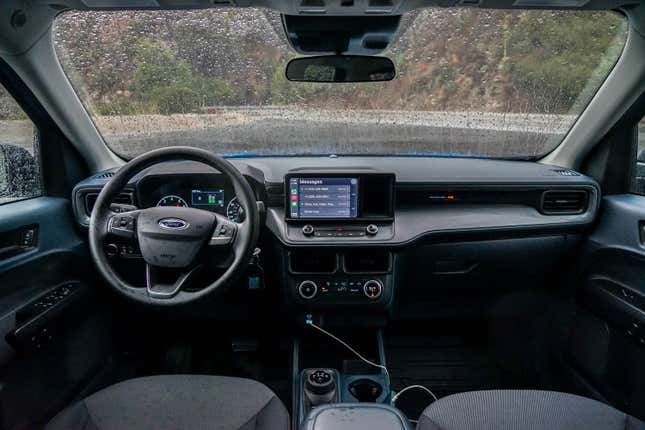
One thing I very much appreciate about the Maverick’s interior is how Ford’s engineers and designers found ways to add function and practicality to the vehicle without adding cost. There are cubbies, pockets and slots all over the cabin for your phone, your wallet and whatever else you can think up. With a truck, you can never have too much storage.
As to tech, aside from the lack of creature comforts due to my tester being a base-spec truck, the Maverick does okay. Ford includes an 8-inch center touchscreen with standard Apple CarPlay and Android Auto, and while the six-speaker stereo system isn’t going to win any awards, for what the Maverick costs, it’s completely adequate.
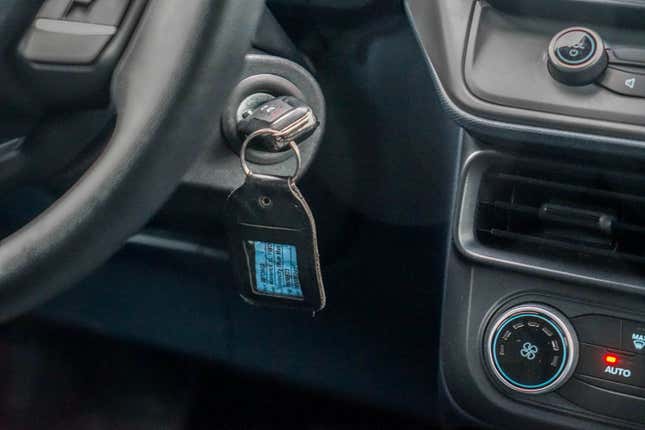
Driver assistance tech is sparse, but Ford’s Co-Pilot360 advanced driver assistance suite is available as a $650 option, though it’ll only get you blind-spot warning, lane-keep assist and driver alerts with that. Adaptive cruise control isn’t available until you step up to the $29,950 Lariat, and even then, it’s a $4,010 option because it’s bundled with a luxury package.
My test vehicle is a little more expensive than a base truck, with a sticker price of $26,405 (also including destination), owing mostly to the addition of the turbo motor and all-wheel drive. There isn’t a lot of competition in this market segment right now, with the Hyundai Santa Cruz being the only other game in town, albeit with slightly less practicality and a slightly higher starting price, but much better standard equipment.
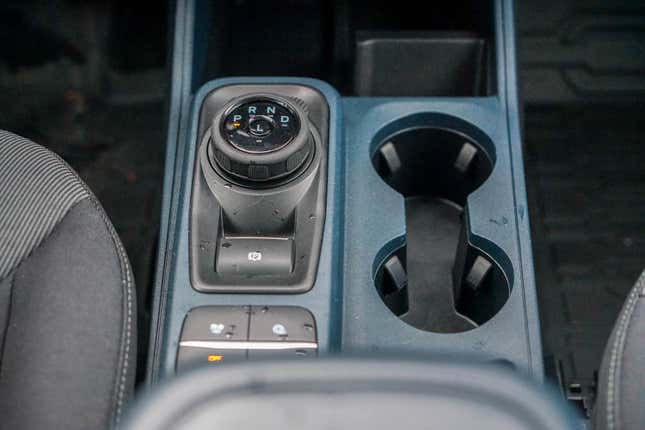
The Maverick is the kind of truck people have wanted since the last Ford Ranger disappeared. It’s cheap, practical transportation from a company that knows how to make really great trucks. It’s also a vehicle that’s best in its most basic form. The more money you spend on it, the less sense a Maverick makes.
Ford’s littlest pickup meets its brief of being an affordable, efficient truck for people who don’t regularly need to tow big RVs or boats or load the bed down with huge loads of rock or bags of cement. It’s 100 percent of the truck that 90 percent of truck buyers actually need.
